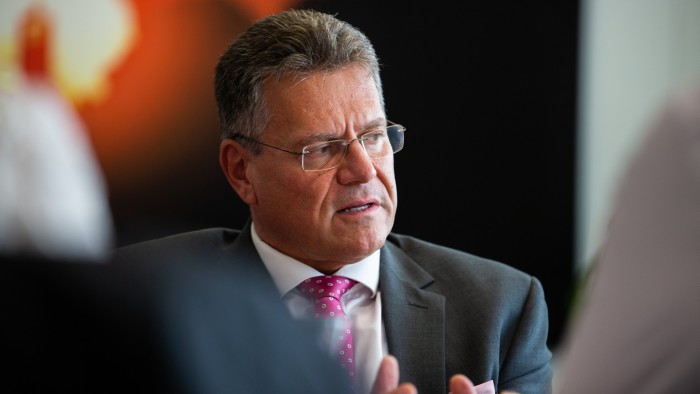Share this @internewscast.com
Unlock the White House Watch newsletter for free
Brussels wants to increase purchases of US goods by €50bn to address the “problem” in the trade relationship, the EU’s top negotiator has said, adding that the bloc is making “certain progress” towards striking a deal.
But Maroš Šefčovič, the EU’s trade commissioner, suggested in an interview with the Financial Times that the bloc would not accept Washington keeping in place 10 per cent tariffs on its goods as a fair resolution to trade talks.
Steep tariffs are due to be imposed on the EU and multiple countries in early July, leaving the bloc racing to avoid a full-blown transatlantic trade war.
The US and EU had made progress through multiple rounds of in-person and telephone negotiations since President Donald Trump imposed, then paused, 20 per cent tariffs on the bloc, Sefcovic said. He added that “his ambition” was still to strike a “balanced and fair” deal with the White House.
Šefčovič said the key argument he was making to US trade representative Jamieson Greer and commerce secretary Howard Lutnick was taking account of American services exports to the EU, which would bring the overall trade deficit with Europe to only about €50bn.
That could be closed rapidly with deals to purchase more US gas and agricultural products, he said.
“If what we are looking at as a problem in the deficit is €50bn, I believe that we can really . . . solve this problem very quickly through LNG purchases, through some agricultural products like soyabeans, or other areas,” Sefcovic said.
“What is very important is that I think we understand each other a little bit better, what is their position, where are they coming from? And I think they understand us a little bit better,” he added. “I think we have a little bit more understanding on the figures.”
But he cautioned it would be “very difficult” to reach a deal that was “clearly good and acceptable for our member states and our European parliament”.
Trump on April 2 imposed a minimum additional tariff of 10 per cent on almost all countries, while proposing extra “reciprocal” duties for some trading partners, including 20 per cent on the EU. Trump later suspended the extra “reciprocal” measures, giving partners 90 days to negotiate.
Sefcovic said the combined potential levies threatened against the EU by Trump were “astronomical figures . . . we clearly communicated this to US: ‘this is unjust, this is unfair’.”
Asked whether he would accept a 10 per cent levy as a floor in trade talks, Sefcovic said the EU regarded that as a “very high level”, suggesting that the bloc would not settle for a deal that kept tariffs at that level.
Since announcing the raft of tariffs, which roiled global stock markets and hit the dollar and US borrowing costs, Trump has weakened some of the measures, offering carve-outs for sectors such as the automotive industry.
“I see that there have been some, let’s say, adjustments or corrections,” Šefčovič said. “I’m sure that I was not the only one to kind of point out some of the potentially negative consequences.”
Trump’s “reciprocal” 20 per cent tariffs against the EU would have been additional to sectoral tariffs of 25 per cent on EU steel, aluminium and cars, which remain in place.
In return for the partial reprieve, the EU paused retaliatory tariffs on €21bn of US goods, including Harley-Davidson motorcycles, poultry and clothing until July 14.
The European Commission negotiates trade measures on behalf of the EU’s 27 member states. Šefčovič said all capitals “want us to negotiate” but were prepared to support further retaliation if there was no deal.
The commission on Wednesday evening privately briefed member states’ ambassadors on areas in which it could offer incentives to the US, but also on preparations of a potential new package of tariffs against America.
“It will not be easy but we will be working meticulously with every member state to have a robust response, which would have unanimous support,” Šefčovič said.
The veteran Slovak commissioner, who said he was in constant contact with negotiators from other countries also trying to strike a deal with Trump, said the EU was also willing to collaborate with the US to help address the impact of China’s export surge as a sweetener for a trade deal.
“We believe that we can actually achieve a lot together, particularly the overcapacity of steel and aluminium working together on semiconductors, overcoming the dependencies on critical raw materials,” he said.






